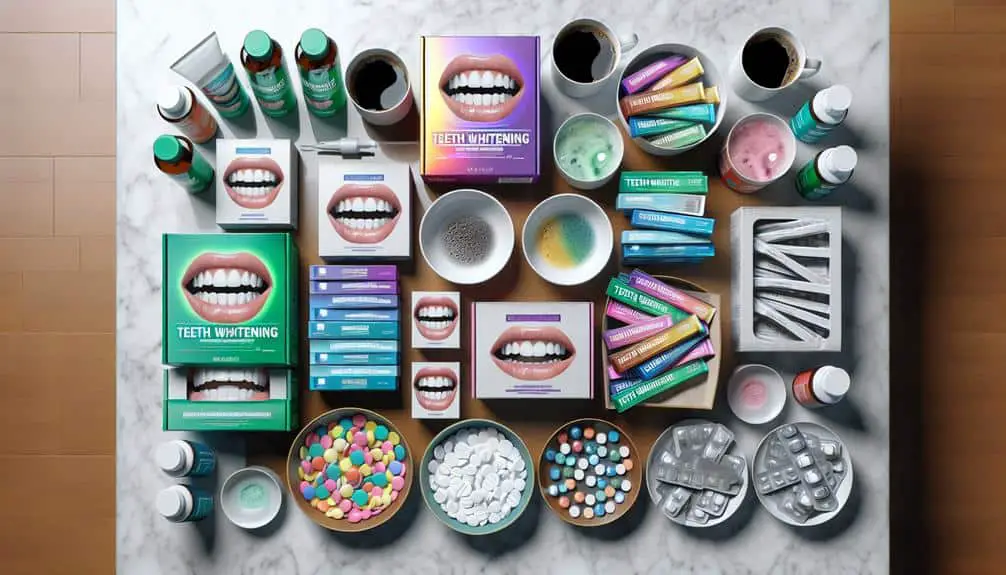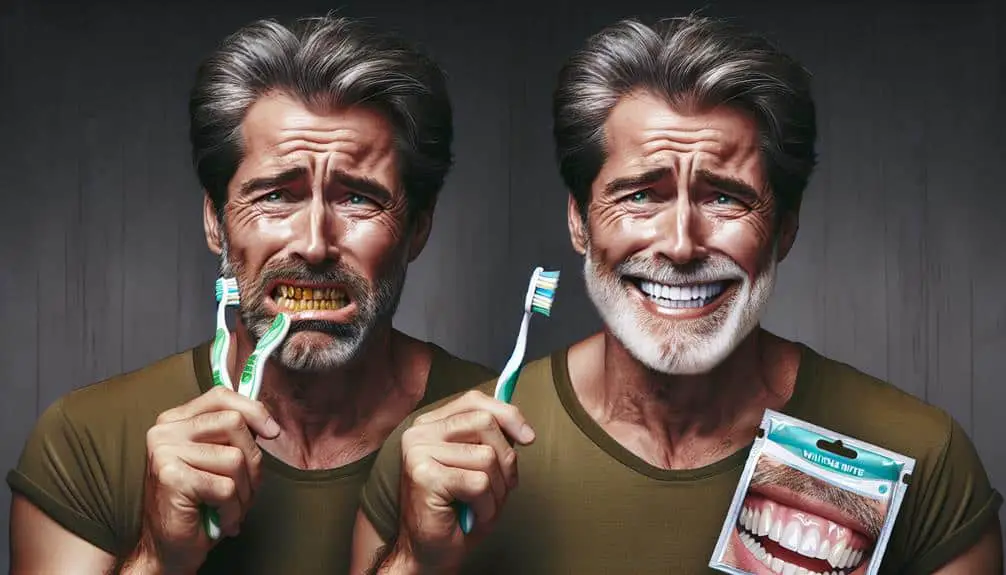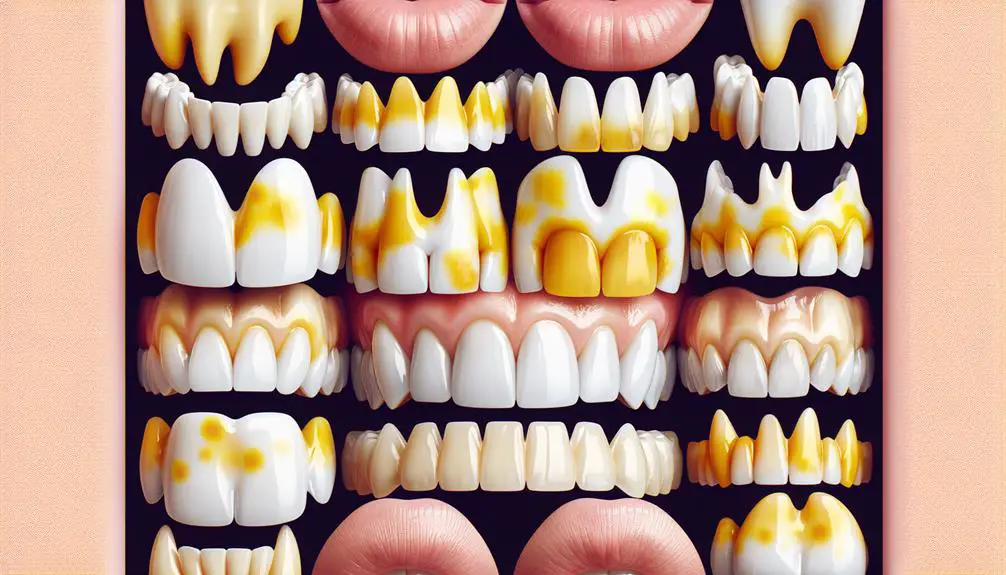To whiten teeth on medication, choose a non-abrasive toothpaste with whitening agents like hydrogen peroxide. Brush at least twice daily and floss regularly. Rinse with water after taking medication to maintain oral pH balance. Limit coffee and tea intake, try using a straw with acidic drinks, and brush after consuming staining foods. Consider whitening trays or strips with peroxide, and don't skip regular dental cleanings. These tips can help maintain a bright smile despite medication-related discoloration. Follow these expert tips for effective whitening results.
Key Points
- Choose non-abrasive toothpaste with mild whitening agents.
- Rinse mouth after medication to maintain oral health.
- Limit coffee and tea consumption; opt for lighter drinks.
- Use a straw for acidic beverages to reduce enamel erosion.
- Consider professional whitening treatments for lasting results.
Choose Non-Abrasive Whitening Toothpaste
When choosing a whitening toothpaste while on medication, opt for a non-abrasive formula to safeguard your enamel and maintain oral health. Essential methods are important for individuals on medication to prevent harming their teeth. Rough toothpaste can erode the enamel, resulting in heightened sensitivity and potential long-term damage. Seek toothpaste that includes mild whitening agents like hydrogen peroxide or carbamide peroxide, which are efficient yet less harsh on your teeth. These components help to break down stains without compromising the strength of your enamel.
Maintaining proper oral care is vital when whitening your teeth, especially when taking medication that may impact your dental health. Non-abrasive whitening toothpaste ensures that you can brighten your smile without causing harm. Remember to brush your teeth at least twice a day and floss regularly. Moreover, consider using a soft-bristled toothbrush to prevent unnecessary abrasion. Prioritize your oral health by selecting gentle whitening products to protect your enamel while effectively removing stains.
Rinse With Water After Taking Medication
After taking medication, it's recommended to rinse with water to help minimize potential side effects on your oral health. Proper dental hygiene plays an essential role in maintaining good oral health, especially when taking medication that may have side effects on the mouth. Here are some reasons why rinsing with water after medication intake is beneficial:
- Reduces Residue: Rinsing with water helps wash away any medication residue left in your mouth, preventing it from lingering on your teeth and gums.
- Maintains pH Balance: Some medications can alter the pH balance in your mouth, leading to acidic conditions that are harmful to your teeth. Rinsing with water can help neutralize acidity.
- Prevents Dry Mouth: Certain medications can cause dry mouth, increasing the risk of dental issues. Rinsing with water helps keep your mouth hydrated.
- Promotes Oral Health: Incorporating this simple step into your routine contributes to overall oral health by minimizing the impact of medication on your teeth and gums.
Limit Coffee and Tea Consumption
To maintain a brighter smile while on medication, consider limiting your intake of coffee and tea, as these beverages are known to cause stains on teeth. Opt for lighter drinks like herbal teas or water to reduce the risk of discoloration.
Remember to rinse your mouth after consuming staining beverages to help minimize their potential impact on the whiteness of your teeth.
Decrease Staining Beverages
Consider reducing your intake of coffee and tea to help minimize staining on your teeth while on medication. These beverages contain compounds that can contribute to discoloration, especially when consumed regularly.
Here are some tips to help you decrease staining beverages:
- Moderate Consumption: Limit the number of cups of coffee and tea you have per day.
- Use a Straw: When possible, drink these beverages through a straw to reduce direct contact with your teeth.
- Rinse with Water: After consuming coffee or tea, rinse your mouth with water to help minimize staining.
- Brush After Consumption: If feasible, brush your teeth or at least rinse your mouth after consuming these beverages to prevent prolonged contact with your teeth.
Opt for Lighter Drinks
To minimize staining on your teeth while on medication, opting for lighter drinks over coffee and tea can help maintain a brighter smile. Coffee and tea are known to cause discoloration due to their intense pigmentation.
Instead, consider choosing lighter options like herbal teas, clear sodas, or water. Additionally, incorporating proper dental hygiene practices such as effective dental flossing techniques and using mouthwash can further aid in preserving the whiteness of your teeth.
Dental flossing helps remove plaque and food particles between teeth, preventing stains and maintaining oral health. Mouthwash benefits include reducing bacteria in the mouth and freshening breath, contributing to an overall healthier oral environment.
Rinse After Consumption
After consuming coffee and tea, it's advisable to rinse your mouth to help limit staining on your teeth. Here are some rinse techniques and hydration benefits to keep in mind:
- Water Rinse: Swish water around your mouth to dilute the pigments that can stain your teeth.
- Use a Straw: When drinking coffee or tea, use a straw to minimize contact with your teeth.
- Chew Sugar-Free Gum: Stimulate saliva production, which can help wash away staining compounds.
- Hydrate Well: Drinking plenty of water not only helps rinse your mouth but also keeps you hydrated, promoting overall oral health.
Use a Straw for Acidic Drinks
When consuming acidic drinks like citrus juices or sodas, using a straw can help minimize direct contact with your teeth, reducing the risk of enamel erosion.
Straws can also assist in directing the liquid towards the back of your mouth, bypassing your teeth altogether.
Acidic Drink Precautions
Consider utilizing a straw for acidic drinks to minimize the contact of these beverages with your teeth. Acidic drinks can contribute to enamel erosion, so taking precautions is essential.
Here are some tips to help protect your tooth enamel:
- Use a straw: Drink acidic beverages like sodas, fruit juices, and wine through a straw to reduce direct contact with your teeth.
- Rinse with water: After consuming acidic drinks, rinse your mouth with water to help neutralize the acid and prevent it from sitting on your teeth.
- Wait before brushing: Wait at least 30 minutes after consuming acidic drinks before brushing your teeth to avoid damaging softened enamel.
- Consider alternatives: Opt for less acidic options or consume acidic drinks in moderation to minimize the impact on your enamel.
Benefits of Using Straw
Using a straw for acidic drinks can greatly reduce direct contact between the beverages and your teeth, helping to protect your enamel. This simple technique minimizes the exposure of your teeth to harmful acidic substances, which can erode the enamel over time.
The benefits of using a straw include maintaining a whiter smile and reducing the risk of tooth decay caused by acidic beverages. However, it's crucial to be aware of potential disadvantages, such as the environmental impact of disposable plastic straws.
To mitigate this, consider using reusable options like stainless steel, glass, or bamboo straws. These alternatives provide the same benefits while being more eco-friendly.
Impact on Tooth Color
Wondering how using a straw for acidic drinks can impact the color of your teeth? When taking medication that may cause tooth discoloration, it's crucial to be extra cautious with your dental care routine.
Here are some key points to bear in mind:
- Acidic drinks: Consuming acidic beverages like citrus juices or sodas can erode tooth enamel, leading to easier staining.
- Straw usage: Employing a straw helps minimize direct contact between the acidic liquid and your teeth, reducing the risk of discoloration.
- Rinse after consumption: Following consumption of acidic beverages, rinse your mouth with water to help neutralize the acids and protect your teeth.
- Regular dental visits: Arrange regular dental check-ups to monitor any changes in tooth color and discuss suitable remedies with your dentist.
Brush Teeth After Consuming Staining Foods
After consuming staining foods, make sure to promptly brush your teeth to prevent discoloration and maintain a bright smile. Oral hygiene plays an important role in preventing stains caused by foods like coffee, tea, red wine, and berries. By brushing your teeth after consuming these items, you can minimize the chances of them adhering to your enamel and causing discoloration. Food choices also impact the color of your teeth, so being mindful of what you eat can help in stain prevention.
Effective dental care goes beyond just brushing; consider using a toothpaste with whitening properties or a mouthwash designed to combat stains. These products can aid in removing surface stains and maintaining a brighter smile. Additionally, flossing daily can help remove plaque and debris that might contribute to discoloration.
Remember to visit your dentist regularly for professional cleanings to keep your teeth healthy and white. Taking proactive steps like brushing after consuming staining foods can go a long way in preserving your smile's brightness.
Consider Professional Whitening Treatments
When looking to enhance the whiteness of your teeth, professional whitening treatments offer numerous benefits. These treatments guarantee long-lasting results and provide expert options tailored to your specific needs.
Consulting with a dental professional can help you explore the most effective whitening treatment for your situation.
Professional Whitening Benefits
Exploring professional whitening treatments can greatly enhance the brightness of your smile, offering long-lasting results that are difficult to achieve with over-the-counter products. Professional whitening provides several benefits:
- Customized Treatment: Professional treatments are tailored to your specific needs.
- Stronger Whitening Agents: Dentists use higher concentrations of whitening agents for more effective results.
- Professional Oversight: Guarantee the procedure is done safely under the supervision of a dental professional.
- Lasting Effects: Experience longer-lasting whitening compared to DIY options.
Professional whitening treatments offer a combination of expertise, advanced techniques, and quality products for a brighter, more radiant smile.
Long-Lasting Results Guaranteed
Consider opting for professional whitening treatments for guaranteed long-lasting results that can greatly enhance the brightness of your smile. Professional whitening procedures performed by dentists are highly effective in removing deep stains that over-the-counter products may not reach. These treatments utilize stronger whitening agents and advanced technology to deliver noticeable results.
While at-home kits can be convenient, they may not provide the same level of whitening or longevity as professional treatments. Additionally, dentists can tailor the treatment to your specific needs, addressing any concerns such as tooth sensitivity.
When comparing costs, professional whitening may initially seem more expensive, but considering the long-lasting results and the expertise involved, it can be a worthwhile investment in achieving a radiant smile.
Expert Treatment Options
For ideal and long-lasting results in whitening your teeth, professional whitening treatments offer advanced solutions to effectively remove deep stains that over-the-counter products may not reach. When considering expert treatments, here are some key points to keep in mind:
- Laser Treatment Effectiveness: Laser whitening is highly effective in removing tough stains, providing noticeable results in a single session.
- Cost Considerations: Professional whitening treatments can vary in cost depending on the type of procedure and location, so research and compare prices is crucial.
- Safety Precautions: Make certain that the dental professional performing the treatment is experienced and follows all safety protocols to minimize risks.
- Post-Treatment Care: Follow any instructions provided by the dentist to maintain the results and prevent sensitivity.
Use Whitening Trays or Strips
To effectively whiten your teeth while on medication, consider utilizing whitening trays or strips as a convenient and efficient method. Whitening trays are custom-made to fit your teeth and are filled with a whitening gel that helps brighten your smile. These trays guarantee that the whitening gel is evenly distributed, allowing for consistent results.
Whitening strips, on the other hand, are thin, flexible plastic strips coated with a whitening gel containing peroxide. They're applied directly to the teeth and are left on for a specified amount of time. Both trays and strips can help whiten your teeth effectively, even while on medication.
When using whitening trays or strips, it's crucial to follow the instructions provided carefully to avoid damaging your enamel. Some products come with enamel protection features to minimize sensitivity and protect your teeth during the whitening process.
Maintain Regular Dental Cleanings
Regularly scheduling dental cleanings is important for maintaining peak oral health and preventing potential issues. By attending regular checkups, you can guarantee your teeth and gums are in excellent condition. Here are some key reasons why maintaining regular dental cleanings is vital for your oral hygiene:
- Plaque Removal: Professional cleanings help eliminate plaque buildup that regular brushing and flossing may miss, preventing gum disease and tooth decay.
- Early Issue Detection: Regular checkups allow your dentist to spot any potential problems early on, such as cavities or gum disease, before they escalate.
- Tartar Removal: Dental cleanings help eliminate hardened tartar that can't be removed by regular brushing, reducing the risk of gum inflammation.
- Overall Oral Health: Consistent dental cleanings contribute to your overall oral health by keeping your mouth clean and reducing the chances of developing serious dental issues.
Try Natural Whitening Remedies
Consider incorporating natural whitening remedies into your oral care routine to help enhance the brightness of your teeth. Natural remedies can be a gentle yet effective way to whiten your teeth without harsh chemicals.
Baking soda is one such remedy that can help remove surface stains and brighten your smile. You can mix a small amount of baking soda with water to create a paste and brush your teeth with it a few times a week.
Another natural option is activated charcoal, which is known for its ability to absorb toxins and stains. Using a toothpaste that contains activated charcoal can help whiten your teeth over time.
Additionally, oil pulling with coconut oil is a traditional remedy that may improve oral health and potentially whiten teeth. These natural remedies can be a safe and affordable way to promote oral health while working towards a brighter smile.
Stay Hydrated for Oral Health
Keeping well-hydrated is essential for maintaining excellent oral health. Hydration plays an important role in keeping your teeth and gums healthy. Here are some key benefits of oral hydration and how it can contribute to better oral health:
- Saliva Production: Adequate hydration helps in the production of saliva, which is vital for washing away food particles and bacteria that can lead to cavities.
- pH Balance: Drinking water helps maintain the pH balance in your mouth, reducing the risk of enamel erosion and tooth decay.
- Preventing Dry Mouth: Staying hydrated prevents dry mouth, a condition that can promote bacterial growth and bad breath.
- Overall Health: Hydration isn't only essential for oral health but also for your overall well-being. Drinking enough water supports the body's natural detoxification processes, which can positively impact oral health.
Frequently Asked Questions
Can Certain Medications Cause More Severe Staining on Teeth Than Others?
Certain medications can indeed cause more severe tooth discoloration than others due to medication interactions and potential drug side effects. It's important to be aware of these effects and prioritize dental health while on medication.
How Long Should You Wait After Taking Medication Before Rinsing With Water?
After taking medication, wait at least 30 minutes before rinsing with water to avoid diluting its effects. Proper brushing techniques can help reduce side effects on teeth. Dentists recommend following specific instructions for each medication.
Are There Any Specific Foods or Drinks That Can Help Whiten Teeth Naturally?
To naturally whiten teeth and boost oral health, consider incorporating specific foods and drinks into your diet. Some natural remedies like crunchy fruits and vegetables, dairy products, and green tea have proven benefits for maintaining a bright smile.
Is It Safe to Use Whitening Trays or Strips While Taking Medication?
Using whitening trays or strips while on medication can have risks. Explore toothpaste alternatives and oil pulling benefits instead. Prioritize oral health by consulting your dentist to find safe and effective whitening solutions.
How Often Should Professional Whitening Treatments Be Done While on Medication?
For best outcomes while on medication, professional whitening treatments should typically be done every 6 to 12 months. Dentists often recommend intervals based on individual needs and the type of medication being taken to guarantee safe and effective results.



